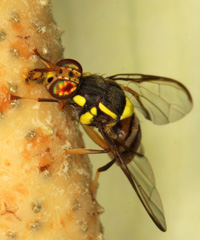Fruit flies: The key to a longer life?
|
Thanks to improvements in our understanding of health, we can all expect to live well into old age. While long life has benefits, it also means we are likely to suffer from the diseases of ageing. What if we could understand the biology of ageing, could we develop treatments that address its causes and in so doing, treat all of the diseases of ageing?
Remarkably, recent research has found genetic and dietary treatments that extend healthy lifespan in lab animals. What’s more, the same treatments appear to work in very different organisms from worms to mice, indicating that these findings could be relevant to humans. Dr Matthew Piper will give an overview of the current state of knowledge of ageing research, with a focus on his field of expertise: flies and their food. |
 A Rod-horn fruit fly by Gbohne |
Matthew graduated with a PhD in Biochemistry and Molecular Genetics from the University of New South Wales, Sydney. He then moved to Delft, in the Netherlands, to work in an industrial fermentation lab where they developed yeast to make high value scents and flavour compounds, such as the rose scent in perfumes. In 2003, he moved to UCL in the UK to work on ageing, using the fruitfly as a model organism. In 2010 he started his own lab with funding from the Royal Society and the BBSRC. His interest lies in how we can use nutrition to improve lifelong health in to old age.
Date: Wednesday 28th November 2012
Time: 7pm, for a 7.30pm start
Place: Upstairs at The Lamb, 92 Lambs Conduit Street, WC1N 3LZ [gmap]
Cost: Free
One Response to “Fruit flies: The key to a longer life?”
-
Week In Geek: 26 November-2 December 2012 | Londonist Says:
November 26th, 2012 at 11:04 am[…] recent advances in research about ageing, and the role fruit flies are playing in revealing the genetics behind ageing. This one’s upstairs at The Lamb on Lamb’s Conduit Street. Free, just turn […]
Leave a Reply
This site is powered by WordPress.
Science London was part of the British Science Association
